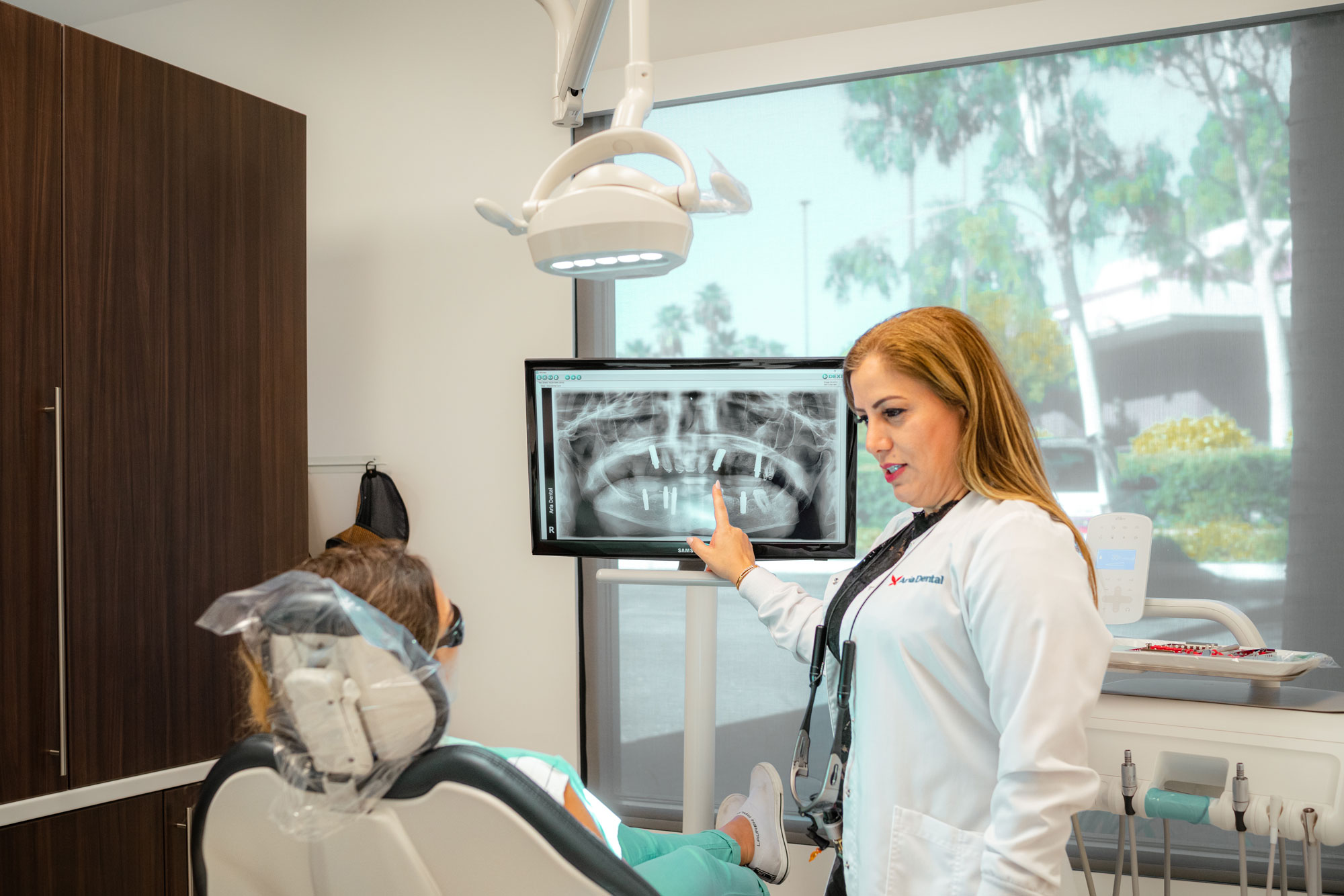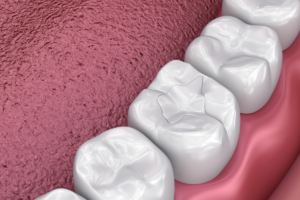Have you been considering dental implants? What do you know about them? And by that question, we mean things other than what is commonly scattered across the internet. Truth be told, a huge large portion of the commonly consumed on the internet comes from extremely skeptical professionals who either see no benefit in uncovering the necessary data or have no actual useful information to share. In this blog, we are going to take a deep look into what Dr. Horiyat actually has to say as a professional who has been a holistic dentist for over a decade.
Make sure to follow this blog and the video all the way to the end.
What Is a Dental Implant?
When one or more teeth are lost, due to whatever reasons, individuals tend to experience a number of very serious complications such as rapid bone loss, defective speech, broken chewing patterns, extreme discomfort when chewing food, and shifting and misalignment of the remaining teeth. However, these are not just it. This can go as far as having changes in the overall facial anatomy and the jawbones. So you see, things can get pretty ugly just by losing one tooth.
Generally speaking, a dental implant is similar to any other implant: it is a medical device that is surgically planted into the bone of the area (that is the jawbone in the case of dental implants) to restore the functionality of that body part which is the tooth. Dental implants are essential for the support of artificial teeth such as dentures, bridges, and crowns.
To make it short, they drastically improve the life and health of the patients.
What Are the Types of Dental Implants?
Generally speaking, there are three main types of dental implants. This categorization is based on how they are implanted for the patients. These are:
Endosteal Implants
These are probably the ones you have seen the most as they are currently the most common type of dental implants used in modern dentistry. Endosteal implants are placed directly into the jaw bone and act as an artificial root to hold a replacement tooth. What is worth mentioning about this type of implant is the fact that they stimulate the jawbone and bone formation and reduce the jawbone atrophy or shrinkage.
Subperiosteal Implants
Unlike the Endosteal Implants, the Subperiosteal Implant is not placed in the jawbone. It is placed under the gum line on top of the jawbone. This is the best option for patients with missing teeth who suffer from having insufficient bone volume or bone density in their jaws. This is often not something your conventional dentist would tell you or look for. That is why in Aria Dental Care we do some extensive testing and consultations prior to getting started with your treatment.
Zygomatic Implants
As the name suggests, the Zygomatic Implants are neither placed in your jaw bone nor in the gums but rather in the zygoma (a.k.a cheek bone). Cheekbones are much stronger and denser than the jawbone is and are used for those who suffer from extreme jawbone loss and who are way past getting endosteal or subperiosteal implants. It is also important to note that this is for patients who need implants in their upper jaw.
Remember that it is going to take a professional to decide which type is right for you and every patient is going to be different.
We are going to dive deeper into Endosteal Dental Implants in this post. These can be used to replace not just one but in many cases several teeth in both the upper and lower jaw.
Endosteal Dental Implants Structure:
Before getting to what these are made of, let’s take a look at their basic structure. While there are certain alterations in the design of these implants, the general endosteal dental implant consists of 3 parts:
Abutment
The abutment is the image we generally have from a dental implant. It is the screw-shaped part that is planted inside the jawbone and acts as the root of the artificial tooth. The entire structure of your treatment is supported by this part.
Implant Body
This is the top part of the implant that is visible right and the restorative part actually sits on. This is often connected to the abutment using a screw system.
Restorative Parts
The restorative party is basically the tooth that will be visible in your mouth. Depending on your treatment this can be a single crown, a bridge, or an entire denture.
Some dental implants are just one part meaning that the abutment and the implant body are just one body and not separate.
What Are Dental Implants Made of?
Generally speaking and putting all the exceptions aside, a dental implant with a well-known safety profile can be made of the following:
1. Titanium and Titanium Alloys
2. Zirconia or Zirconium Oxide
3. Gold Alloys
4. Cobalt-Based Alloys
5. Ceramic Materials
As you might have already guessed, some of these options are more luxurious than the rest and hence are not as common as titanium, zirconium oxide, or zirconia dental implants.
Titanium vs. Zirconia
There are obvious reasons why dental implants are made up of such a variety of materials more importantly why there are made of zirconia. To be very short and concise about this, you need to know that zirconia has some magical properties that other metal implants black. For example, zirconia is known to be extremely biocompatible compared to titanium. This means that is zirconia dental implant will blend in much better with your jawbone and your gum resulting in zero toxicity, zero buildup of bacteria and microorganisms, and of course zero chronic diseases.
The truth being told the presence of chronic diseases due to poor and unholistic dental treatments is overshadowed by many dentists and organizations, while everybody knows that quite a few of the chronic diseases people have been facing, which are often left undiagnosed, actually come from non-biocompatible dental material and appliances used in dental offices.
So why is zirconia so much better than titanium? Generally, speaking titanium and titanium alloys have been used to fabricate various implantation and fixation systems across the medical and dental field. As you may already know, titanium has a grayish metallic color zirconia is white. After decades of research, titanium dental implants have originally become a cornerstone of modern prosthetic restoration after tooth loss in Dentistry.
However, modern studies have shown that titanium dental implants can be a leading factor in triggering the immune system and causing multiple health issues at the same time. They are also known to be very limiting when it comes to aesthetics and cause a very annoying metal taste in the mouth.
After excessive studies, the scientists realized that the dream material for a dental implant is zirconium. Zirconium is a transition metal, that is true, but when zirconium gets oxidized, zirconium oxide or zirconia, it becomes completely ceramic with absolute zero metal characteristics
In the video below, Dr. Horiyat has extensively, explained the differences between zirconia and titanium implants so make sure to watch that one before moving on.
To wrap things up on this front here are ten reasons why you should always go for your dental implants:
1. Ultra-Biocompatible – No metal, no reaction, and No toxicity Vs. Titanium implants are only bio-tolerable for some patients.
2. Great Epithelial or Gum Attachment so low gum recession around Zirconia dental implants
3. Low Plaque Accumulation around Zirconia dental implants- Unlike titanium dental implants that collect plaque and bacteria easily
4. Great White Color and esthetics
5. Corrosion Resistance in the moist oral environment- No metal so obviously no corrosion
6. Zirconia is ceramic and Metal-free- So No Metal Taste- Some patients complain about a metal taste with their Titanium dental implants.
7. Favorable Mechanical Properties, such as
8. Low thermal conductivity- they tend to prevent heat transfer and have fewer free electrons, unlike titanium dental implants.
9. Improved flexural strength and fracture toughness- so they do not fracture easily.
10. Zirconia implants have effective osseointegration or bone formation as good as titanium.
To turn you away from zirconia implants, many dentists may claim that zirconia is not as strong as titanium when it comes to dental implants. While this fact may be correct mechanically, it is absolutely not applicable when it comes to dentistry. Numerous data and research have shown that zirconia dental implants have adequate fracture resistance, and toughness, and are just as good and capable as titanium dental implants are.
Dr. Horiyat firmly states: “In my personal clinical experience after several years, I have never had any patient breaking their Zirconia dental implants. I have seen bone loss around Titanium implants but no significant or obvious bone loss around my Zirconia dental implants even after several years.”
Why Should You Avoid Titanium Dental Implants?
Besides everything that we have discussed so far, titanium dental implants, come with other problems and side effects. The most important one is that over time titanium dental implants, which are metal alloys will corrode in the moist environment of the oral cavity. this means that there will be metal released into your gum and the bone which could lead to severe medical conditions and allergic reactions, including automatic diseases, hypersensitivity, chronic fatigue, inflammation of the bone, and even brain fog. Yes, that is right! Your brain fog may be due to your oral hygiene. We highly recommend you watch the video below and then move forward.
It is important to mention that some of these medical conditions led by titanium dental implants are irreversible so why not just opt for biocompatible, metal-free, dental implants, a.k.a. Zirconia implants?
What about titanium implants in other parts of the body?
That is an excellent question! Titanium implants have proven to be a cornerstone in creating prosthetics for other parts of the body so why not for the teeth as well? The answer is very simple. Having your titanium implant anywhere else in your body means that the implant is actually placed within, the tissues or the bones.
When it comes to dental implants, it is true that the implant placed inside the bone and the gum however is still in contact with the moist environment of your mouth and acidic oral environment which is also likely to include plague and bacteria around it. This means that you’re titanium implant will be acting differently in your mouth compared to the rest of your body.
Why Do Most Dentists Prefer Titanium Dental Implants?
Now that we have learned so much about the superiority of zirconia dental implants, and the toxicity of titanium, the question is why do most dentists prefer titanium dental implants?
There were several answers to this question, but the most important and obvious one is that all conventional dentists are predominantly taught to place titanium implants. This means they have not received exclusive training for placing a zirconia dental implant. This also likely means that their offices are not equipped with suitable tools and gears such as drills and drives to install these implants.
Another reason for this is that placing zirconia dental implants is not only quite difficult but also quite expensive, especially for placing only a few dental implants occasionally.
The Life Span of Each Dental Implant
OK, so you have decided to get a dental implant, but how Long does a dental implant last? Well, the average one is going to last you anything between 15 to 30 years depending on your overall oral health and how will you take care of them. It is worth mentioning that absolutely no other tooth replacement such as crown, bridge, or removable partial options will last that long. So they are actually very good investments in the long run. They’re going to save you a lot of money and discomfort in the future.
And if you are up for zirconia or ceramic implants, which we think you absolutely should, because they are metal-free they will have zero corrosion and less plaque collection resulting in longer life spans.
What Is The Best Brand For Dental Implants?
In today’s world, few dental implant brands are considered leaders in the global dental implant market. Among them is the Swiss brand Straumann. The world’s No. 1 manufacturer, Straumann, is the originator of many technologies and techniques in implantology because Straumann dental implants Guarantee the Device’s Reliability and Ensure its Durability.
Another reason why this brand of implant is so popular with implantologists is the predictability for both their Zirconia and Titanium implants.
Another Zirconia Swiss brand dental ceramic implant is Z-System with great options for Restorability and Less Impurities compared to other Zirconia dental implants shown in recent research for elemental analysis of Zirconia dental implants. Z-system Exclusively Makes Zirconia Implants and no Titanium implants; so, their focus and research are only on Zirconia or ceramic implants.
Based on my clinical experience, these two implant systems have been my favorite dental implants, but I am very sure other dental providers might have different experiences.
Is there going to be pain after the procedure?
It is true that most of the patients have reported experiencing little to no pain after their implant placement, however, we often inform our patients to expect some temporary pain. This pain is often not very extreme and treatable with simple natural home remedies or some painkillers.
You should remember that luring or worsening pain can well be a sign of a complication, depending on your condition and the extent of your surgery. A general rule of thumb is to wait for five days and if the pain is still present, call your dentist so they can take a look at your implants and see what is going on.
Final Words
After reading this article and watching all the videos here, you must have good overall understanding of what dental implants are and how they work. The next step for you will be receiving a consultation from Dr. Horiyat to check up on your dental health and discuss whether you actually need a dental implant and if you do, what kind. Feel free to contact us by clicking here or on the banner below.



















